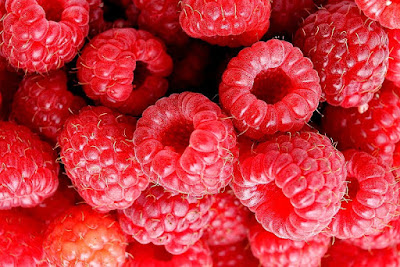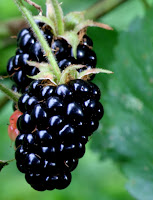Raspberry are fruits of plants belonging to many species of the genus Rubus. European species are Rubus idaeus.
Raspberry is eaten as fruit, made into juice, processed and dried for many grocery uses.
Raspberry contains high amounts of polyphenol antioxidants. It contains a very high dietary fibre content of upto 20%.
It is a rich source of vitamin C giving 50% of the daily requirement in 100 g.
60% of the dietary rquirement of manganese is available in 100 g of raspberry.
Considerable amounts of B vitamins, magnesium, iron and copper are present in the fruits.

Raspberry nutrition
| Nutrients | Units | per 100g | 1 cup chopped (125g) | 10 numbers (19) |
|---|---|---|---|---|
| Water | g | 85.75 | 105.47 | 16.29 |
| Energy | kcal | 52 | 64 | 10 |
| Protein | g | 1.20 | 1.48 | 0.23 |
| Total fat | g | 0.65 | 0.80 | 0.12 |
| Ash | g | 0.46 | 0.57 | 0.09 |
| Carbohydrate | g | 11.94 | 14.69 | 2.2 |
| dietary fibre | g | 6.5 | 8.0 | 1.2 |
Raspberry nutrition facts: carbohydrates
| Carbohydrates | Units | per 100g | 1 cup chopped (125g) | 10 numbers (19g) |
|---|---|---|---|---|
| Sugars | g | 4.42 | 5.44 | 0.8 |
| Sucrose | g | 0.20 | 0.25 | 0 |
| Glucose | g | 1.86 | 2.29 | 0.4 |
| Fructose | g | 2.35 | 2.89 | 0.5 |
Rasberry fruit facts: minerals nutrition
| Minerals | Units | per 100g | 1 cup chopped (125g) | 10 numbers (19g) |
|---|---|---|---|---|
| Calcium | mg | 25 | 31 | 5 |
| Iron | mg | 0.69 | 0.85 | 0.13 |
| Magnesium | mg | 22 | 27 | 4 |
| Phosphorus | mg | 29 | 36 | 6 |
| Potassium | mg | 151 | 186 | 29 |
| Sodium | mg | 1 | 1 | 0 |
| Zinc | mg | 0.42 | 0.52 | 0.08 |
| Copper | mg | 0.09 | 0.11 | 0.02 |
| Manganese | mg | 0.67 | 0.82 | 0.13 |
| Selenium | mcg | 0.2 | 0.2 | 0.0 |
Nutrition facts: vitamins
| Vitamins | Units | per 100g | 1 cup chopped (125g) | 10 numbers (19g) |
|---|---|---|---|---|
| Vitamin C | mg | 26.2 | 32.2 | 5.0 |
| Thiamin | mg | 0.03 | 0.04 | 0.01 |
| Riboflavin | mg | 0.04 | 0.05 | 0.01 |
| Niacin | mg | 0.60 | 0.73 | 0.11 |
| Pantothenic acid | mg | 0.329 | 0.405 | 0.063 |
| Vitamin B 6 | mg | 0.055 | 0.068 | 0.010 |
| Folate | mcg | 21 | 26 | 4 |
| Choline | mg | 12.3 | 15.1 | 2.3 |
| Vitamin A | IU | 33 | 41 | 6 |
| Vitamin E (alpha-tocopherol) | mg | 0.87 | 1.07 | 0.17 |
| Vitamin K (phylloquinone) | mcg | 7.8 | 9.6 | 1.5 |
Fruit facts: lipids
| Lipids nutrition | Units | per 100g | 1 cup chopped (125g) | 10 numbers (19g) |
|---|---|---|---|---|
| Saturated fatty acids | g | 0.02 | 0.02 | 0 |
| Monounsaturated fatty acids | g | 0.06 | 0.08 | 0.01 |
| Polyunsaturated fatty acids | g | 0.38 | 0.46 | 0.07 |
Source: USDA National Nutrient Database 2009









